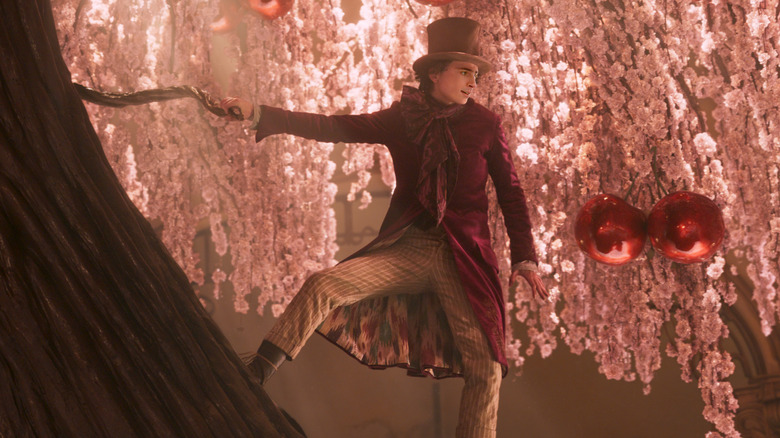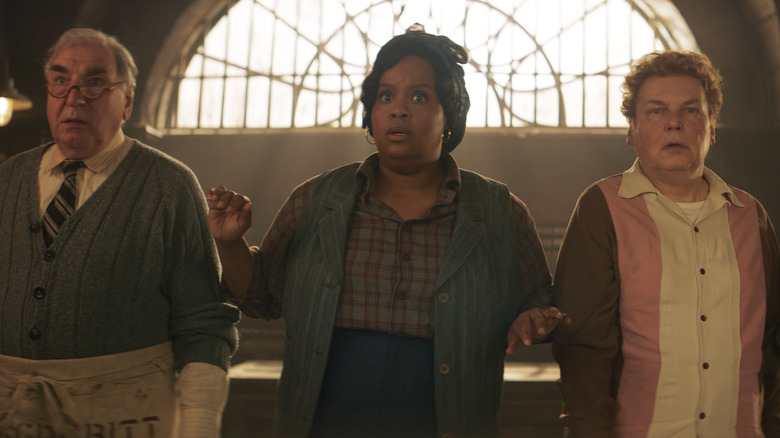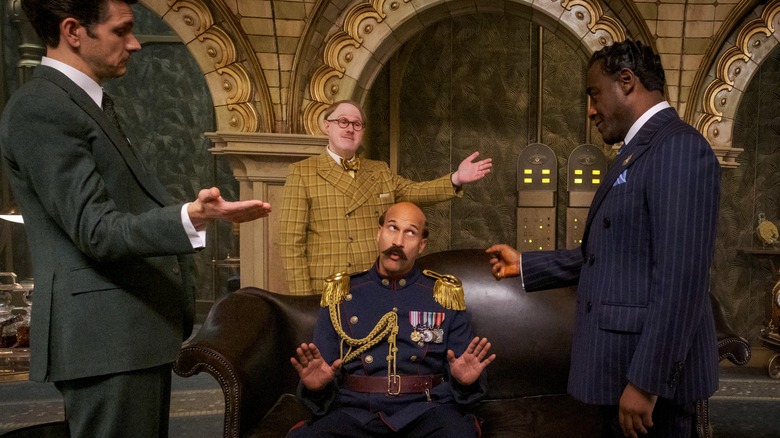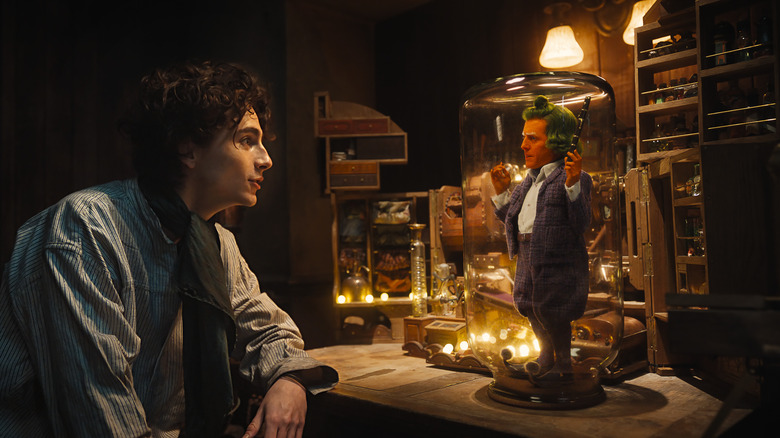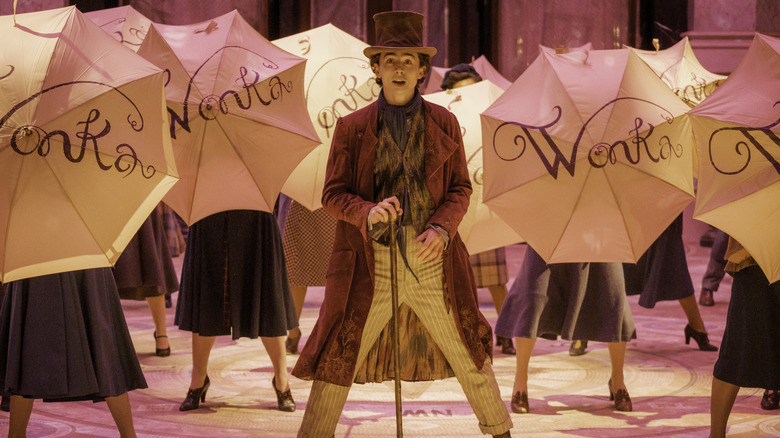Wonka Ending Explained: In A World Of Capitalist Corruption
No one really asked for a prequel to "Willy Wonka and the Chocolate Factory" that focused on the origin of a future psychotic child murderer – especially if it meant losing a third Paul King "Paddington" movie. Even fewer people could have predicted that "Wonka" would end up being a pretty great film. As our own Ethan Anderton wrote in this review, the film has a "well-thought-out story that doesn't even lean heavily on nostalgia or cheeky references to the classic film adaptation."
Indeed, the film is a riot. Paul King delivers a whimsical, colorful holiday film for the whole family that features a fantastic ensemble that steals every scene they're in, and there's a sense of whimsy that is reminiscent of King's "Paddington" movies. Timothée Chalamet finds the right balance between homaging Gene Wilder and doing his own weird little chocolate-loving psycho. There are even hints of some of his wilder "Saturday Night Live" sketches in here, particularly "Tiny Horse" and "Rap Roundtable" sketches. Though trailers downplay it, this movie is a full-on musical, and Paul King crafts great musical numbers that capture the wonder and magic of Roald Dahl's work.
Whether you skipped the movie and want to know how it connects to the 1971 classic, or you want to reminisce about the fun of the film after watching it, let's break down how the story of "Wonka" plays out and what the ending means for Willy Wonka's future.
A world of pure imagination
"Wonka" gives its titular chocolate maker another tragic backstory to match the Tim Burton version, complete with parental issues but without quite so much macabre oddity. Here, we learn that Willy Wonka was in the Amazon with his mom when she was researching spiders right before she died. In the jungle, she taught him to make chocolate, and now he dreams of sharing her chocolate dream with the world. The problem is that the fictional chocolate capital of Europe he arrives in is ruled by an evil chocolate cartel and a corrupt chief of police (Keegan-Michael Key) with a sweet tooth. Luckily, Wonka befriends a group of misfits (including a banker, a telephone operator, and a street urchin named Noodle) that help him become a threat to the cartel, thanks to his unique and magical sweets.
Unfortunately, the cartel is just too powerful and wealthy. They cheat and manipulate Wonka out of town — and even try to kill him — in order to regain control. While all this is happening, Wonka also deals with an Oompa Loompa named Lofty (Hugh Grant), who is chasing Wonka for stealing cocoa beans from Loompaland and needs enough chocolate to repay the debt.
Class struggles
After surviving an assassination attempt by the cartel, Wonka realizes that Noodle is related to its leader, Slugworth. To get revenge and to prove the cartel's corruption, Wonka and the group plan a deliberate heist to expose the cartel once and for all. After using a giraffe as a distraction, Wonka and Noodle sneak into the cartel's vault and find a ledger with damning evidence. Before they can escape, however, they are cornered by the cartel and thrown into a big chamber to die by drowning in chocolate.
Thankfully, the two are saved from death by Lofty, who rescues them and also drains all the cartel's chocolate by dumping it into the nearby fountain. The cops finally take the cartel away — including the corrupt chief of police — to prison. Finally free to open his own chocolate store without any threats, Wonka helps reunite Noodle with her birth mother, pays off his debt to Lofty, and even purchases an abandoned castle to turn it into a chocolate factory, bringing Willy Wonka closer to turning into the chocolatier we all know.
The chocolate wars
There's something special about watching a fun and silly little family film that suddenly turns into a story about class warfare, such as "A Bug's Life" or "Chicken Run." It would be simple for a prequel to "Willy Wonka & the Chocolate Factory" to have the villain be just a jealous chocolate maker who feels threatened by Wonka. But Paul King chose to make this a story about three rich men who control and game the market and force every newcomer to submit to them, and that's what makes this feel like more than a lazy cash-grab.
The trio controlling the chocolate cartel are not just rival chocolatiers, they are a cartoonish force of evil. Their lair is literally in a vault beneath a cathedral, guarded by chocolate-addicted priests. The original film featured poignant satire, but "Wonka" manages to work in some surprisingly resonant themes, particularly around Mrs. Scrubbit, the hostel/laundry owner. Scrubbit essentially tricks people into signing a contract for forced labor, exploiting them to maintain her business. Human trafficking much? Sure, the film still features an Oompa Loompa doing his silly song and dance and chocolates that make people fly, but the film's villains give the story more weight.
The future of Wonka
Though there has been no news of a "Wonka" sequel, its star and director already addressed the possibility. As Paul King told Total Film, there is source material to work with.
"[Dahl] didn't really write sequels, but this was the one book where he clearly felt there was more in the tank there. There's an awful lot more 'Wonka' story that we have that we would like to tell. I would definitely like to do more. And I'd like to spend more time in this world, and meet some more Oompa Loompas."
As for Chalamet, he told Entertainment Tonight that he'd be up to returning for a sequel "if there was a story to be told," before adding that "evidently there is." Whether we see that story play out or not remains to be seen, but there's still a way to go before this version of Wonka becomes a child murderer.
